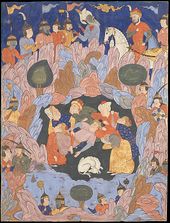Template:Pictorial-Islam-options: Difference between revisions
| [checked revision] | [checked revision] |
mNo edit summary |
mNo edit summary |
||
| Line 1: | Line 1: | ||
<noinclude>Also see: [[Template:Pictorial-Islam]]</noinclude><!-- HELP NOTES: Each option tag handles one random story --><choose> | <noinclude>Also see: [[Template:Pictorial-Islam]]</noinclude><!-- HELP NOTES: Each option tag handles one random story --><choose> | ||
<option weight="1">{{Pictorial-Islam|1=Mamta Kulkarni's Alleged Conversion to Islam|2=[[File:Mamta Kulkarni.jpg|150px|link=Mamta Kulkarni - Conversion to Islam]]|3=Reports concerning the alleged conversion and marriage of Mamta Kulkarni and Vicky Goswami first started circulating in May 2013. Since then, Kulkarni has stated categorically several times that she is neither married to Goswami nor a follower of Islam. She has in fact demonstrated through her words and actions that she has become a devout follower of Hinduism since her retirement from Bollywood. | |||
A point that is also overlooked by those who propagate these false rumors is that by celebrating the alleged conversion of Kulkarni and Goswami, a conversion that is said to have been prompted by the unequal laws applied to non-Muslims in the United Arab Emirates, they are effectively celebrating the legalized oppression of non-Muslims that exists in many Islamic societies. ([[Mamta Kulkarni - Conversion to Islam|''read more'']])}}</option> | |||
Revision as of 13:55, 5 April 2014
Also see: Template:Pictorial-Islam
|
